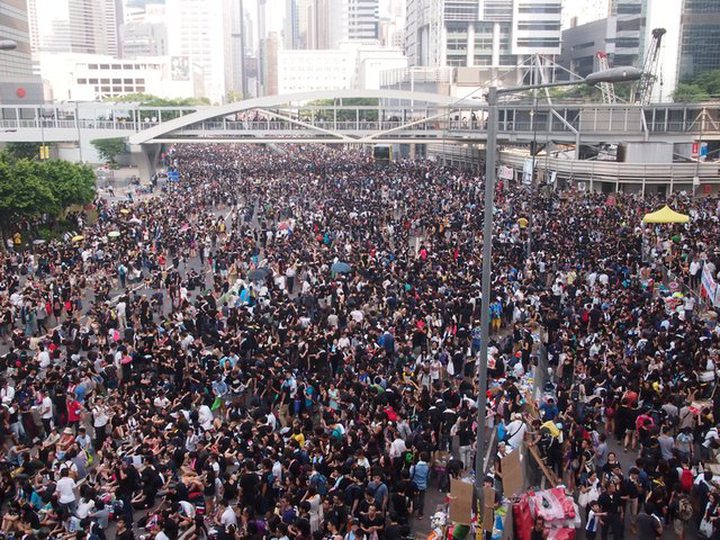Pro-Democracy Protesters in Hong Kong Give Deadline for Demands

Leung Chun-ying said that Beijing would not reverse its earlier decision to hand-pick eligible candidates to lead the former British colony, which became part of China in 1997.
"I don’t believe that the continued use of illegal activities will compel the Chinese government to reverse the… ruling by the National People’s Congress Standing Committee," said Leung, who also rejected calls from the protesters to step down.
"Any personnel change before the implementation of universal suffrage is achieved would only allow Hong Kong to continue to pick its leader under the Election Committee model," he added.
The protesters want a reversal of a decision by China's government in August that a pro-Beijing panel will screen all candidates in the territory's first direct elections, scheduled for 2017 — a move they view as reneging on a promise that the chief executive will be chosen through "universal suffrage."
Occupy Central, a wider civil disobedience movement, said in a tweet that the deadline set by the pro-democracy protesters includes a demand for genuine democracy and for Leung's resignation. It said it would "announce new civil disobedience plans same day," without elaborating.
"If Leung Chun-ying doesn't come out to Civic Square before midnight ... then I believe inevitably more people will come out onto the streets," said Alex Chow, secretary general of the Hong Kong Federation of Students, the organizer of the university class boycotts that led to the street protests.
Chow said the students were considering various options, including widening the protests, pushing for a labor strike and possibly occupying a government building.
Leung addressed the group directly in his media briefing Tuesday, saying "Occupy Central founders had said repeatedly that if the movement is getting out of control, they would call for it to stop. I'm now asking them to fulfill the promise they made to society, and stop this campaign immediately."
China's government takes a hard line against any threat to its monopoly on power and has condemned the protests as illegal. So far, however, it has not overtly intervened, leaving Hong Kong authorities to handle the situation under the "one country, two systems" arrangement that guaranteed the former British colony separate legal and economic systems and Western-style civil liberties after China took control in 1997.
Hong Kong's free press and social media give the protesters exposure that may help prevent China from cracking down in the same way it has on restive minorities and dissidents living in the mainland, where public dissent is often harshly punished.
Even larger crowds are expected to flood the streets Wednesday, China's National Day holiday. The government said it was canceling a fireworks display planned to celebrate the day, which marks the 1949 founding of the People's Republic of China.
One day after police shocked the city by firing tear gas at crowds, the protesters were peaceful on Monday night, singing as they blocked streets in several parts of Hong Kong. They also staged a brief "mobile light" vigil, waving their glowing cell. Crowds chanted calls for Leung to resign, and sang anthems calling for freedom.
Police arrested a man who drove his Mercedes-Benz through a crowd of protesters occupying a street in the densely populated Kowloon neighborhood of Mong Kok. Local television footage showed people scrambling as the car sped through the crowd while honking just before 2 a.m. No one was injured.
Despite Leung's urgings that they disperse, thousands of people — many of them university and high school students, some doing homework — gathered on a six-lane highway Tuesday next to the local government headquarters.
"We are not afraid of riot police, we are not afraid of tear gas, we are not afraid of pepper spray. We will not leave until Leung Chun-ying resigns. We will not give up, we will persevere until the end," Lester Shum, another student leader, shouted to a swelling crowd at Admiralty, near Hong Kong's waterfront.
Officials announced that schools in some districts of Hong Kong would remain closed Tuesday because of safety concerns, while dozens of bus routes were canceled and some subway stops near protest areas were closed.
The protests have been dubbed the "Umbrella Revolution" by some, because the crowds have used umbrellas to not only block the sun, but also to stop the police from hitting them with pepper spray. Political slogans calling for freedom have also been written on the umbrellas.
Many younger Hong Kong residents raised in an era of plenty and with no experience of past political turmoil in mainland China have higher expectations. Under an agreement set in 1984, before most of them were born, Beijing promised to allow Hong Kong residents civil liberties -- unseen in the rest of China -- after it took control of the city.
Across the border, Chinese state media have provided scant coverage of the protests beyond noting that an illegal gathering spun out of control and was being curtailed by police.
The protests began a week ago with a class boycott by university and college students demanding reforms of the local legislature and a withdrawal of Beijing's requirement that election candidates be screened. Leaders of the broader Occupy Central civil disobedience movement joined the protesters early Sunday, saying they wanted to kick-start a long-threatened mass sit-in demanding Hong Kong's top leader be elected without Beijing's interference.





